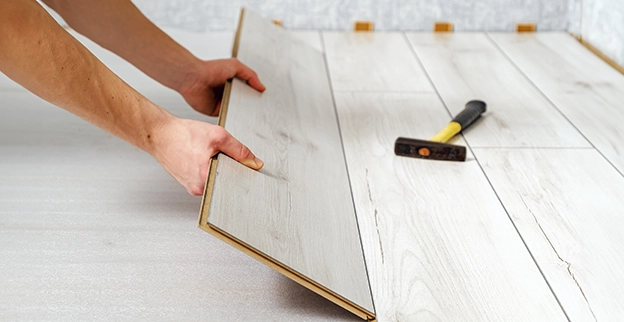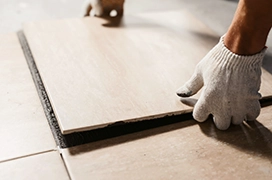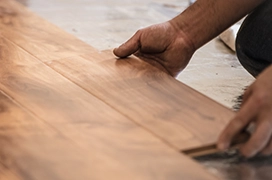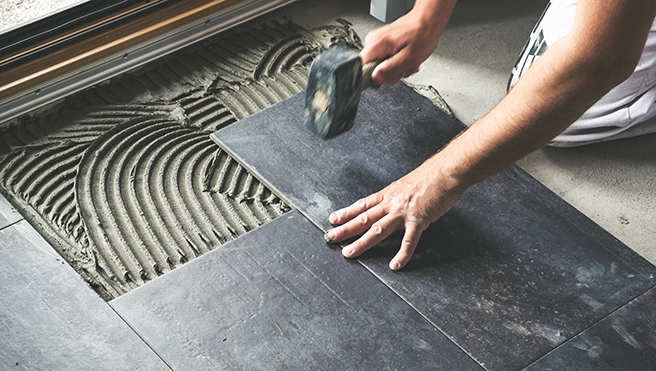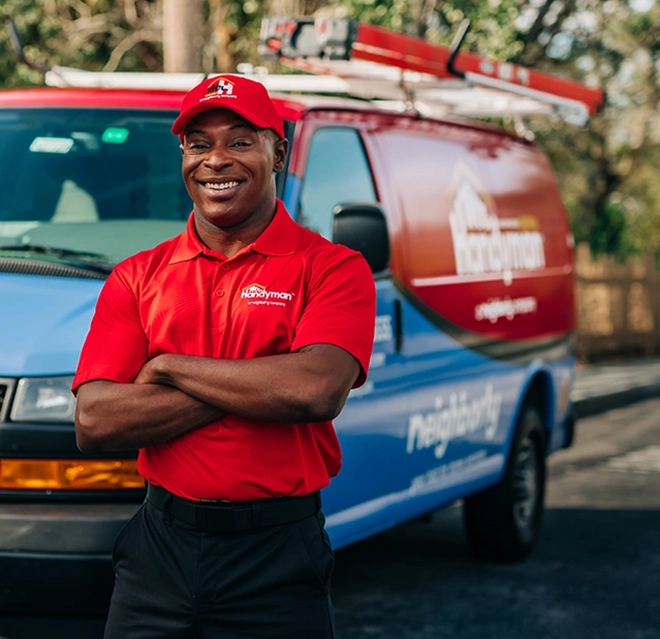As your locally-owned business, Mr. Handyman of Charleston and Summerville has served the community for over 40 years and is proud to have formed a strong relationship with our clients. Every service technician on our team is highly trained, bonded, and insured, and brings many years of experience helping our clients maintain their homes to ensure indoor and outdoor perfection. Trust us to take your next flooring project seriously because we’ll go above and beyond to prove it.
Charleston Flooring Installation Options
New flooring styles and materials are always hitting the market, which explains why the paradox of choice has overwhelmed so many homeowners. There is no need to despair because our professional installers in Charleston have seen it all and know what’s popular and most functional for each home in our community.
Unlike other land-locked states, South Carolina deals with a high level of humidity throughout the year. The high amount of water vapor in the air is not only uncomfortable but also risky for metallic and wood materials on your property. There is also the hurricane season that can wreak havoc on your property, impacting your home’s exterior with a high level of salinity. That said, humidity and salt air also infiltrate your home’s interior, affecting your furniture and your solid hardwood floor.
Let’s look at the options available for your upcoming flooring installation in Charleston, SC. Our service technicians at Mr. Handyman bring the required knowledge to help our customers choose what’s right for them, with their needs in mind as well as the local climate.
Solid Hardwood Flooring Installation in Charleston, SC
Many property owners appreciate wood materials because our state is popular for providing hardwood materials made of boxelder maple, hickory, or sycamore. Therefore, obtaining this material doesn’t cost as much as other parts of the country, as you don’t pay an import fee. So, as a wood lover, it’s hard to resist wood flooring installation in Charleston, SC. Our team of handymen are your local pros for this job, and we make sure you know the required maintenance.
Sourcing this type of material locally is an effective way of reducing your carbon footprint. However, we have to emphasize that a hardwood floor installation is most suited for dry climates. To ensure its performance in Charleston homes, there is a list of recommended maintenance tasks that include combining dehumidifiers with air conditioning systems and ensuring your home’s insulation is efficient and, ideally, working in combination with an attic fan. Maintaining a decent temperature and moisture level at home will best protect your hardwood floors. This way, they can last you for over 30 years.
Engineered Wood Flooring Installation in Charleston, SC
Our Charleston flooring experts highly recommend engineered wood if the high maintenance of natural wood is too much of a bother. While it contains natural hardwood pieces, engineered wood also contains wood scrap and fiber, combined with adhesives and other chemicals to become more resilient and durable when made into compressed layered planks. This is the best alternative to traditional hardwood and is much less sensitive to high moisture. Engineered floors don’t shrink or expand, but boards may cup or crack. If well-maintained, they can last for 25 years.
Natural Vs. Engineered Wood:
While both are strong and durable, natural hardwood has a solid core, whereas engineered does not because it’s compressed into up to six layers of wood planks. Both types are designed for heavy foot traffic, but one is more sensitive than the other without routine maintenance.
Whichever one you opt for, our Charleston flooring installation experts strongly recommend that you allow your new flooring materials to acclimatize upon arrival. This allows your materials to adjust to your living space’s temperature and moisture levels. Your local Charleston handyman will then inspect the wood material’s quality and moisture levels before installation.
The installation process is slightly more difficult when choosing natural hardwood because you need to ensure your subfloor is healthy and the floor is fully level. Proper staining is also required as you go, along with sanding and finishing.
Tile
Another popular option for flooring installation in Charleston is tile flooring installation. Whether you choose ceramic tile or porcelain tile, both are highly durable and popular for kitchen and bathroom settings. Some people even equip their entire home with tile to keep maintenance to a minimum!
When choosing tiles, there is a wide variety of types. Not everyone is fully aware that tiles are porous, no matter which material you decide to have installed. The trick of professional tile laying lies in proficiency in installation and using high-quality grout and sealant.
Both ceramic tile and porcelain tile are similar options made from clay, except that porcelain goes through an additional heat treatment to become denser and harder. Although both are great quality, porcelain is often preferred for areas with high foot traffic.
The biggest advantage of tile is that its versatility allows you to choose from a variety of styles, colors, and shapes. Besides that, you can ask for glazed or unglazed surfaces, though we recommend unglazed for a safer non-slip flooring installation. Glazed provides a protective glass coating for enhanced waterproofing characteristics.
Common tile floor issues include a worn surface sealant due to extensive use of chemical cleaners. It may not be immediately apparent until you start noticing stains on your tile sheets or discolored, crumbling grout. Tile systems are designed to resist water and are probably one of the few types that work best for wet mops. Not all ceramic and porcelain tiles need sealing, but you should check with the manufacturer to be sure. Natural stone tile, on the other hand, requires sealing at least once a year.
Your Charleston flooring installation expert highly recommends resealing the grout lines as soon as the previous layer of sealant wears off. That said, you may choose from several types of grout before our professional installation, from sanded to unsanded. There is only one type of grout that is non-porous—epoxy grout—which may be the best option for your particular needs. Feel free to ask our technicians any questions that you may have about laying tiles and which grout is best suited for which tile material.
Luxury Vinyl Plank (LVP) and Luxury Vinyl Tile (LVT)
LVP and LVT are next on our list of recommendations. Made of multiple layers of PVC backing and glass fiber materials, LVP is a highly durable material that does not splinter or crack. Its superior surface coating allows it to imitate the look of stone or wood.
For this reason, luxury vinyl planks are designed in plank form, whereas luxury vinyl tiles are made in tile shape. Though designed to look like hardwood or tile, they are easy to install and maintain while also offering the same kind of durability and resilience as their counterparts.
Luxury vinyl is waterproof and weather-resistant. Many property owners even opt for luxury vinyl floors in their bathrooms and kitchens. Both types of flooring will add a sense of elegance and timeless appeal to your home, and it’s even DIY-friendly if you opt for the click-lock installation option. Typically, LVP and LVT are installed as floating floors, which means that they float above your subfloor, so you won’t invest additional time in securing your luxury vinyl onto any type of underlayment.
One minor drawback is that they are sensitive to sunlight, which could lead to fading. Applying UV inhibitors is highly recommended to protect your vinyl flooring.
Also, Ask Us About:
